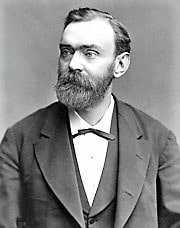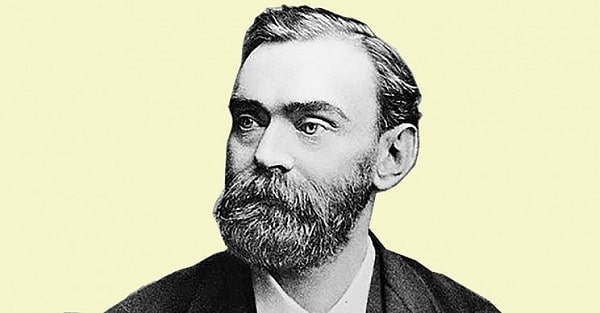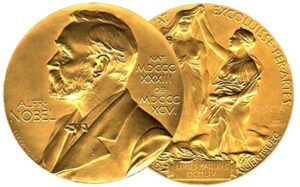Alfred Nobel (Born on October 21, 1833 – Died on December 10, 1896) also known as Alfred Bernhard Nobel is a Swedish chemist, industrialist, and arms manufacturer. Custodian of more than 350 scientific patents during his lifetime, including that of dynamite, an invention that made him famous.
He founded the AkzoNobel company in 1871 and bought the Bofors arms company in 1894. In his will, he bequeathed his immense fortune for the creation of the Nobel Prize. The chemical element nobelium was named in his honor.

Quick Facts Of Alfred Nobel
- Born: On October 21, 1833, Stockholm, Sweden
- Full name: Alfred Bernhard Nobel
- Known for: Benefactor of the Nobel Prize, inventor of dynamite
- Nationality: Swedish
- Occupation: Chemist, engineer, inventor, businessman, philanthropist
- Father: Immanuel Nobel
- Mother: Andriette Nobel
- Died: On December 10, 1896, Sanremo, Italy
- Burial: Norra begravningsplatsen, Stockholm, Sweden
- Net worth: $250 million (in 2020 dollars, adjusted to inflation)
- Awards: Legion of Honour
Alfred Nobel Early Life
Alfred Bernhard Nobel is the third son of Immanuel Nobel (1801 – 1872) and Andriette Ahlsell Nobel. Member of the Nobel family with many engineers, it comes down to Olaus Rudbeck (1630 – 1702), one Swedish scientist of the best known of the 17th century, author of science fiction Atlantis.
At the age of nine, he moved with his family to St. Petersburg, where his father, who would later invent modern plywood, founded a marine mining company. Immanuel Nobel settled in Russia in 1838 after suffering a setback in his country with a pacifist tradition, his inventions of explosives, such as mines, obtaining little success in Sweden.
At the age of 18, Alfred moved to the United States, where he studied chemistry for four years and worked for a short time with John Ericsson. In 1859, the management of the father’s business was left to his brother Ludvig Nobel (1831 – 1888), who later founded the Ludvig Nobel and Branobel Machine-Building Factory in Russia, becoming one of the richest and most powerful men in Russia.
Alfred Nobel Inventions
For centuries, gunpowder remained the only powerful explosive. In 1846, nitrocellulose was discovered, then in 1847, by Ascanio Sobrero, nitroglycerin. In 1850, Alfred Nobel spent a year in Paris to study under the direction of Théophile-Jules Pelouze, a colleague of Ascanio Sobrero.
Returning with his father to Sweden, Alfred devoted himself entirely from 1862 to the study of explosives and in particular to the use and secure marketing of nitroglycerin. A frustrated man of letters, he wrote at that time, in English, poems of poor literary quality and two unfinished novels, Brothers and Sisters and In Lightest Africa.
In 1871 he founded KemaNobel, one of the companies behind AkzoNobel. Several explosions took place in the family factory in Heleneborg, including a particularly disastrous one which, on September 3, 1864, claimed the lives of five people including Emil, the younger brother of Alfred.
He, therefore, strives to make the use of nitroglycerin less dangerous and is the first to succeed in mastering its explosive power.
Alfred Nobel accidentally discovers (by chance and serendipity) that when nitroglycerin is mixed with an inert, absorbent solid called Kieselguhr (Diatomaceous Earth), it becomes much safer to transport and handle, the explosion requiring the use of a detonator. He developed the “patented Nobel detonator” in 1865.
Alfred Nobel Invented Dynamite
Back in Europe in 1856, Nobel patented a series of refinements for bombs. He invented a relatively safe first detonator in 1863, while two years later he invented the first blasting cap. Unfortunately, on September 3, 1864, Emil, his youngest brother, lost his life during a severe explosion in the workshop-shed.
Other fewer severe incidents with nitroglycerin occurred in the following months, until Alfred, in a plant in Geesthacht, Germany, managed to perfect the use of the same, through an inert powder composed of diatomaceous earth. And, later, also of simply compressed sawdust, thus making the explosive more manageable, solid, and stable.


